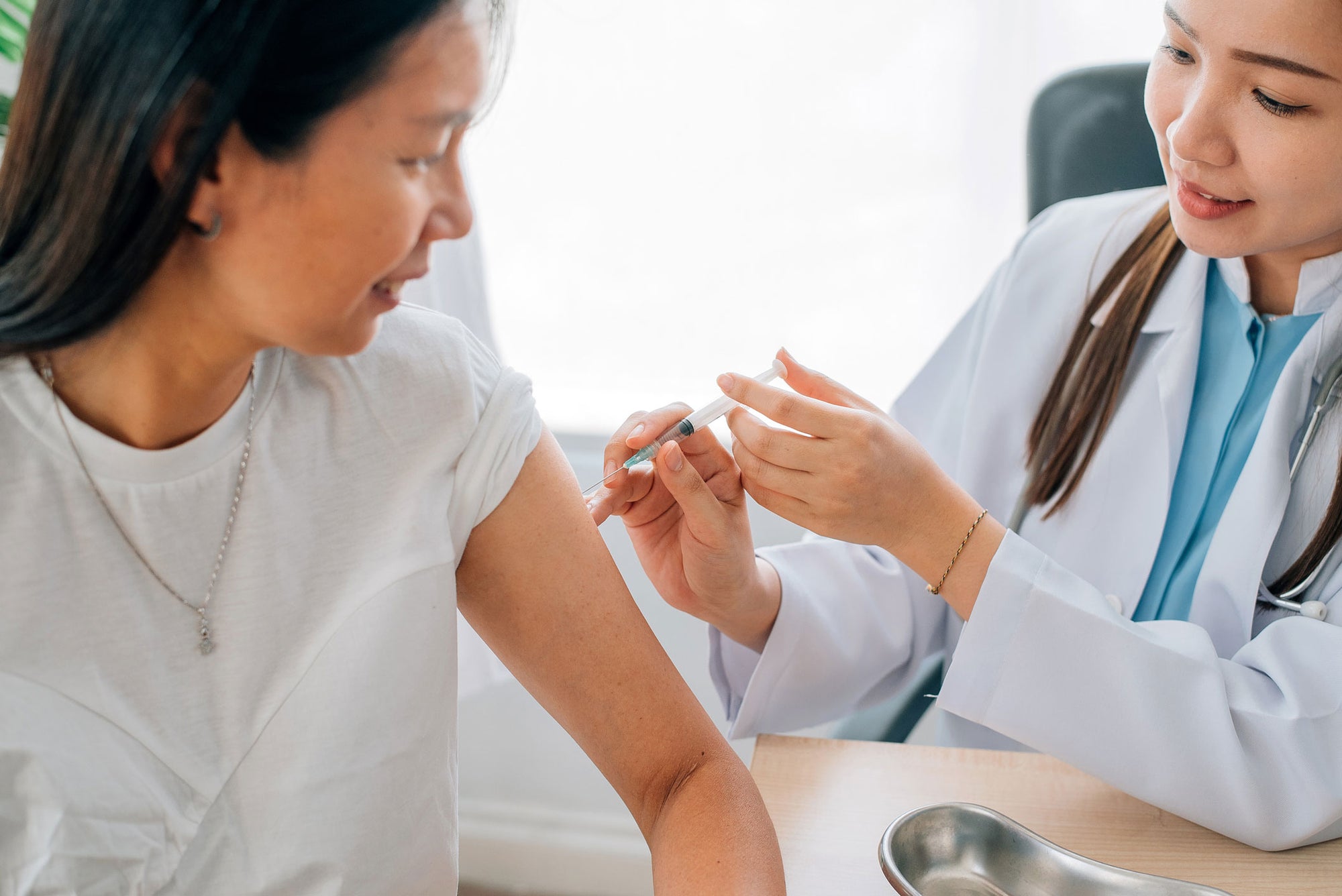The Rise of Ozempic for Weight Loss
Ozempic, also known as semaglutide, was originally designed as a treatment for type 2 diabetes. But on June 4, 2021 the FDA approved the first weight-loss drug since 2014. Ozempic, or Wegovy, another brand name of semaglutide, has been making waves since then. Many people are turning to this drug as a way to shed pounds quickly, and it’s been hailed as a game-changer in the weight loss world. It does work better than previous weight loss drugs, but like any shortcut, there’s a catch—and for some, it’s called “Ozempic face.”
What Is "Ozempic Face"?
“Ozempic face” is a term that’s been popping up on social media and in conversations about weight loss. It refers to the hollow, aged look that some people experience after losing weight with Ozempic. The face can lose its youthful fullness, leading to a more sunken appearance that some say makes them look years older. While shedding extra pounds can feel amazing, this unexpected side effect has left many wondering: What’s going on here?
The Science Behind Rapid Weight Loss and Facial Changes
When you lose weight quickly, your body doesn’t just burn fat—it can also lose something called fat-free mass, which includes muscle. It is impossible to lose weight quickly and only lose fat. Some muscle loss is inevitable. So, this loss isn’t limited to your arms, legs, or core; it can happen in your face too. Without the natural padding of fat and muscle, your facial features may start to look more pronounced, and skin can sag, creating that aged appearance.
Is Ozempic Worse for Aging Skin than Other Weight Loss Methods?
All rapid weight loss methods cause the loss of some muscle, usually around 25-30% of total weight loss is lean tissue, also called fat-free mass. It basically is everything but the fat in the body, not just muscle. And as you lose a bunch of weight it is obvious that some fat-free mass has to go as well. After all, you are becoming a smaller version of yourself. Ideally, if you have a puffy face, you want to lose the fat in your face and be more attractive. One of the goals for weight loss is to look younger, and "Ozempic face" is definitely not going the right direction.
But, while becoming smaller, you would like to become leaner as well, right? You don't want to be skinny fat. So, here is the catch. In clinical trials, such as the Step 1 Trial for Ozempic, the fat-free weight loss was nearly 40%, not just 20-30%. For the average participant that started out at 232 pounds, they lost 30.0 pounds over the 68 week trial. Fat loss was 18.4 pounds, along with 11.6 pounds of lean tissue, according to the DEXA scans of 140 people in the study. Ideally, the lean tissue loss would have been around 5-7 pounds, not nearly 12 pounds!
How Ozempic Causes Muscle and Fat Loss
Ozempic works by mimicking a hormone in your body that regulates appetite. Essentially, it makes you feel full faster and eat less. And your stomach stays full longer, so you actually are fuller. So, you end up eating a lot less calories while on the drug. This of course leads to weight loss, but your body may not always distinguish between fat and muscle when it’s burning calories. Unfortunately, this means some of the muscle mass you lose could be from your face, contributing to “Ozempic face.”
The Impact of Losing Facial Muscle and Fat
For many people, losing weight is about feeling and looking healthier and younger. But when your face starts looking older, it can be frustrating—or even upsetting. It is all backwards!
But beyond aesthetics, losing muscle is a health concern, too. Muscle is essential for strength, energy, and even keeping your metabolism running smoothly. So, while Ozempic may help you shed pounds, the way it affects your face and muscle mass might not align with your goals. And if you gain back weight after getting off the drug, which is what usually happens, you don't gain muscle back unless you work at it. And most people don't work at it, so they end up with a worse, fattier body composition than before they started losing weight.
How to Prevent "Ozempic Face"
The good news? There are ways to fight back against “Ozempic face.” As Dr. Stu Phillips mentioned on the podcast Docs Who Lift, "Muscle and fitness is made in the gym, but weight is lost in the kitchen."
-
Lift Weights. Add Strength Training to Your Routine: Resistance exercises, like lifting weights or doing bodyweight workouts, can help you maintain muscle mass while losing fat. This is the tried and true method for preserving muscles while losing weight.
According to a study published in The New England Journal of Medicine weight loss induced by calorie restriction and either aerobic exercise, resistance exercise, or a combination of both showed that resistance exercise or a combination of aerobic and resistance exercise prevented loss of lean mass and strength better than aerobic exercise alone. So, lifting weights is vital to keeping your muscles. "Use or lose it" applies to muscle and bone strength. By lifting weights it is possible that you will get smaller muscles, but gain in strength at the same time. Fatty muscle in obese people isn't as strong as lean, trained muscle, so it is OK to slim down some. -
Eat Enough Protein: You don't have to become a protein-aholic, but protein is helpful in maintaining muscle mass. Just be careful where you get your protein. Make sure you’re majoring on protein from plant foods like beans, lentils, some organic soy products, and nuts and seeds. Use more food-based proteins and use supplemental protein powder just as that, a supplement for an extra serving or two. This may be difficult, seeing that Ozempic makes a lot of people feel nauseated a lot of the time.
How much protein do you need? About 0.5 grams per pound of body weight will be enough. It isn't as much as some bodybuilders recommend, but it is more than the RDA (0.8 g per kg of body weight / 0.36 grams per pound of body weight) and protein guru Dr. Stu Phillips says this is enough to maintain your lean body mass.
Other Common Side Effects of Ozempic
“Ozempic face” isn’t the only side effect to be aware of. Some users also report nausea, vomiting, constipation, and diarrhea. Rarely, serious complications like pancreatitis or gallbladder issues can occur. Gallstones are a common issue with rapid weight loss. Always consult a healthcare provider before starting any new medication, especially one with such powerful effects.
Is Ozempic the Right Choice for You?
Ozempic might seem like a miracle for weight loss, but it’s not for everyone. In another blog I discuss the weight loss plateau that is seen in every study of the drug. You may not be happy with where the drug leaves you. Before starting this or any medication, it’s important to weigh the benefits and risks with your doctor. Keep in mind that lasting weight loss always requires more than just a pill—it takes a healthy, lower calorie diet than you are used to, regular aerobic and resistance exercise, and a commitment to sticking with a new lifestyle.
Conclusion
“Ozempic face” is a real and surprising side effect of using Ozempic for weight loss. While the drug can help you drop pounds, you need to use it alongside of at least resistance exercise (lifting weights), and probably with aerobic exercise as well to prevent "Ozempic face" and the loss of muscle mass. The key to healthy weight loss is balance: preserving your muscle, protecting your health, and taking care of your body as a whole. And you can lose weight, lots of it, without Ozempic as well.
Losing weight should make you feel better and look better, not older. By taking a thoughtful approach and working with your doctor and health coach, you can find a plan that helps you achieve your goals—without sacrificing your smile in the mirror.







